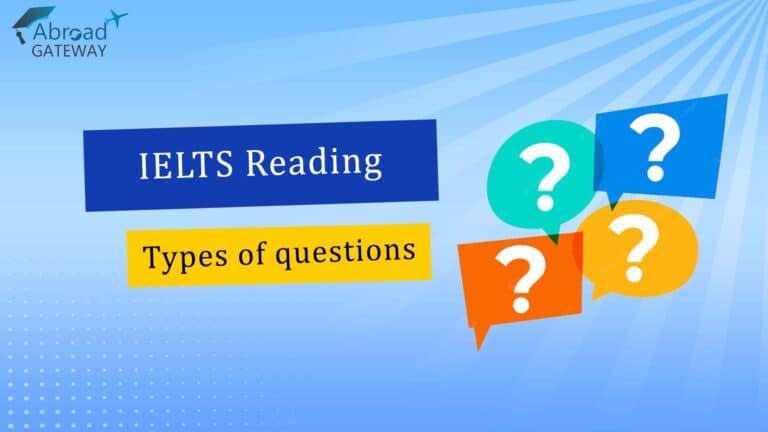Types of questions in IELTS Reading

All of the IELTS test modules are equally important but in the IELTS exam, the IELTS reading module cannot be underestimated at any cost. One must prepare strategically to achieve high bands in this module of the IELTS test. Primarily, we have to understand what the IELTS reading contains. Now let’s look at the pattern of the IELTS reading module.
First of all, the IELTS reading test is present in both types of the IELTS exam, i.e. IELTS academic and IELTS general training.
Let’s have a brief overview of the pattern in the IELTS reading test.
Pattern:-
Number of Questions: 40 questions
Duration: 60 minutes
Number of sections -3
Number of paragraphs- 3 (for IELTS academic) and 5 (for IELTS general training)
Types of questions in IELTS reading test:
In IELTS reading module, we can categorise the types of questions into two parts:
Let us have a look at Easy types of questions first:-
Easy:
These questions are categorised as easy ones because they do not take much time as these questions are in serial order and these questions takes less time to solve. Here are some of the Easy kinds of questions in IELTS reading.
True/False/Not Given:
In this type of question, one has to read the paragraphs and tell whether the statement given in the question is true, false or not given in the whole passage.
Yes/No/Not Given:
One has to answer yes if the statement agrees with the author’s view, No if the statement contradicts and not given if the information is not present at all
Fill in the blanks:
These are the usual questions in which one has to fill all the blanks in a given statement following the given passage.
MCQ:
In this type, one has to read the paragraph and choose the most appropriate option following the statement and the given passage.
Short answer questions (SAQ):
In this type, one has to understand the question’s meaning and try to answer in brief after reading the passage.
Now comes the next type of questions i.e. tough ones.
Tough Questions:
These types of questions are considered tough questions because they are not in serial order and generally consumes more time than the easy ones. These questions require keen observation and a better understanding of the passage.
Heading match:
In this type of question, one has to read and try to underline the passage’s main idea thoroughly and try to match the given headings to their relevant paragraphs.
Sentence Completion:
In this type, one has to read the paragraph and complete the sentence given in the question. So, reading the sentences in the questions first helps a lot as it provides a brief idea of the passage before even reading it.
Name Matching:
In this type, one has to match the ideas related to the respective person. Therefore, the passage must be read thoroughly to identify the opinions of respective persons
Consequently, these were all the types of questions in the IELTS reading.
In the next blog, you will get to know the strategies to solve each type of question accurately.
Other Services
Other Courses
About Us
Privacy Policy
Book Your Meeting
Contact Us
